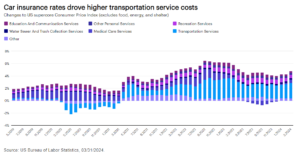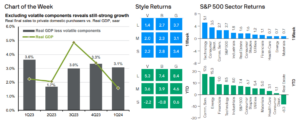In one of the less surprising major news stories of recent months, Elon Musk announced that he would terminating his deal to buy Twitter (TWTR). The unexpected break of a major merger would normally dash the acquiree’s stock price. That TWTR is “only” down about 8% tells us that the market had already priced in a significant chance that the deal would not be completed at the agreed-upon $54.20. The Musk/TWTR soap opera now looks as though it could run for years.
It is quite possible that there will be no winners in this endgame, with the notable exception of the highly paid teams of lawyers whose billable hours will swell during the ensuing fracas. About six weeks ago we commented that “if he [Musk] walks away it would be a lose-lose round of expensive litigation amidst a lower TWTR price. “ As I see it – and let me be clear that I have no credentials as an attorney – there are a few possible outcomes, with the likeliest being:
- TWTR accepts the $1 billion breakup fee and goes about its business
- TWTR sues for specific performance from Musk
- The two parties negotiate a settlement, which could include:
- Termination with a larger breakup fee
- Musk taking over TWTR at a lower price
None of them appear to be a win-win at this point, and each party appears to have significant incentives to prolong the fight to minimize their negative outcomes. There is no way that TWTR could be satisfied with a mere $1 billion at this point. If they were, they would asked for the money and been done with it. But there’s also no indication that Musk would be willing to pay even that breakup fee if he legitimately believes that TWTR was acting in bad faith. Zero outlay is the preferred outcome for Musk, even if it costs his millions in legal fees to achieve it.
As for specific performance, this would be the preferred outcome for TWTR. I have seen plenty of commentary that TWTR has a reasonable chance of suing on that basis. Specific performance would include forcing Musk to take over TWTR for $54.20 or paying them a similar amount in damages[i]. It was obvious that TWTR’s management and board were enamored with Musk’s offer since they didn’t even bother to negotiate. If someone offered me $5 million for my house, waived inspection, and signed a contract with very few contingencies, I would say yes without hesitation and the buyer would rightfully have cause to wonder why I said yes so quickly. We explained it this way in May:
Suppose there is a house that you really like, and you think it is in your price range. So, you impulsively make an offer to buy that house and pick a value that has some significance to you, say $542,000. In your enthusiasm to buy the property, you signed a contract that was not contingent upon the house passing inspection (aka due diligence) – despite rumors that there were issues with mold. You then realized that no one else was even willing to pay even $440,000 for the house and the mortgage was going to be more costly than you expected, so you try to get the seller to cut the price because you now think the mold problem that you intended to fix is indeed quite bad. The mold (aka bot accounts) may indeed be worse than the seller claimed, but you forfeited your contractual right to make that a reason to lower the price. How do you expect that to work out for you? The stakes are much bigger in the case of TWTR and the lawyers will be much more expensive than local real estate attorneys, but I believe that the analogy works.
But there is a huge problem for TWTR here. Elon Musk is not like you and me. He has already thumbed his nose at the SEC, and it might not be out of the question for him to do so to the Delaware Chancery Court. Even after this round of long and expensive litigation, it is entirely possible that further rounds of long and expensive appeals or further litigation to enforce the court’s ruling could ensue.
Those disparate outcomes mean that the best course of action is likely a negotiated settlement. But what that might entail is difficult to imagine. A takeover at a lower price seems like it could be a reasonable outcome, but we don’t know that Musk even wants to run TWTR at this point. We might expect that TWTR would accept a larger breakup fee, say $5 billion, but they’ve given no indication what amount – if any – might be acceptable to them.
There were some who thought that a deal termination could be win for Tesla (TSLA). That is not out of the question, because removing the distraction of TWTR could allow Musk to focus more closely on running TSLA. But a protracted legal battle seems quite distracting in and of itself. Furthermore, if there was any doubt that Musk was capricious and vindictive, those should be removed at this point. Neither is an attractive quality for a CEO, particularly when he manages a huge, complex company that sports a premium valuation. Much of the investment appeal of TSLA hinges upon Musk’s personality and accomplishments. There is little that he can do to diminish his appeal to his most devoted investors (or index funds), but there could easily be otherwise dismayed investors. We might be able to explain some of today’s 6% decline in TSLA to worries about renewed Covid fears in China, but I think it is more likely explained by the TWTR news.
Interestingly, one of the few winners is Digital World Acquisition Corp (DWAC), the SPAC that is attempting to merge with Trump Media, the owners of Truth Social, a TWTR competitor. DWAC is now up about 12% (after opening about 25% higher) on news of the TWTR deal’s woes, but that stock had been falling steadily on legal issues of its own. DWAC may be a beneficiary of TWTR trouble, but investors in that company need to brace for their own potential litigation.
In April, shortly after TSLA reported first quarter earnings and the TWTR deal was announced, we questioned, “At What Point Do We Reach Peak Musk?” At this point it appears that the peak was reached around the time we asked the question. Yet we will have years to ponder it further.
—
[i] Again, I am NOT a lawyer, nor do I even pretend to offer legal opinion
Disclosure: Interactive Brokers
The analysis in this material is provided for information only and is not and should not be construed as an offer to sell or the solicitation of an offer to buy any security. To the extent that this material discusses general market activity, industry or sector trends or other broad-based economic or political conditions, it should not be construed as research or investment advice. To the extent that it includes references to specific securities, commodities, currencies, or other instruments, those references do not constitute a recommendation by IBKR to buy, sell or hold such investments. This material does not and is not intended to take into account the particular financial conditions, investment objectives or requirements of individual customers. Before acting on this material, you should consider whether it is suitable for your particular circumstances and, as necessary, seek professional advice.
The views and opinions expressed herein are those of the author and do not necessarily reflect the views of Interactive Brokers, its affiliates, or its employees.





























